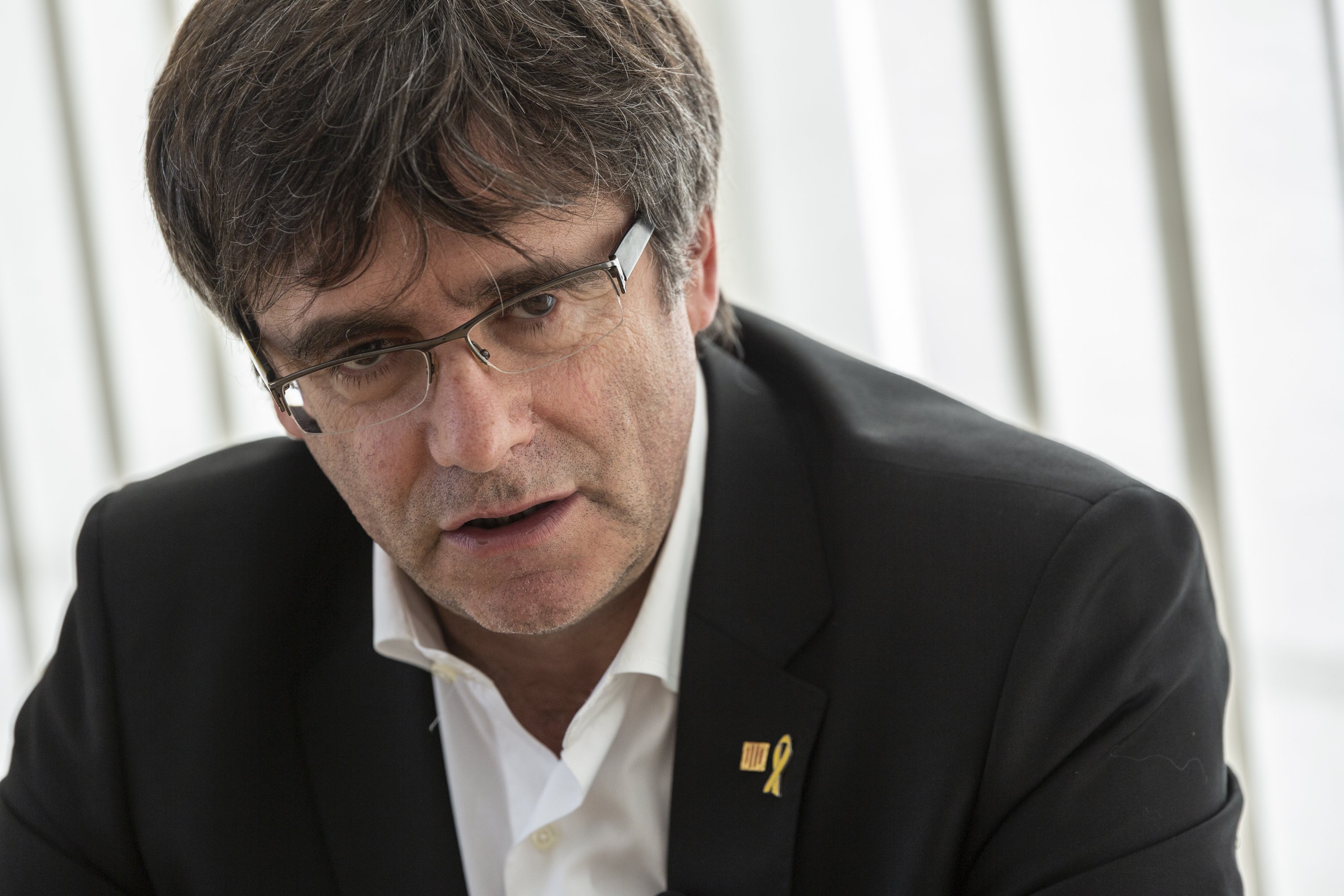Viewed from Waterloo, the parliamentary arithmetic in Madrid appears as a first-order strategic element in the Catalan independence movement's political struggle with the Spanish state. Catalonia's Carles Puigdemont says bluntly that the pro-independence deputies at present are the “making or unmaking” of Spanish prime ministers, that it is impossible to negotiate a Spanish budget with independence leaders in prison and exile and that, therefore, “it must already be clear by now to the Spanish government” that it will not be able to go ahead with its budgetary plans. The president sums up the recent gesture of Podemos' Pablo Iglesias as an attempt to open a dialogue, while he attacks Spanish king Felipe VI for putting himself “in the front row” of the repression against Catalonia. After yesterday's first installment, here's part two of El Nacional's interview with Catalonia's exiled president:
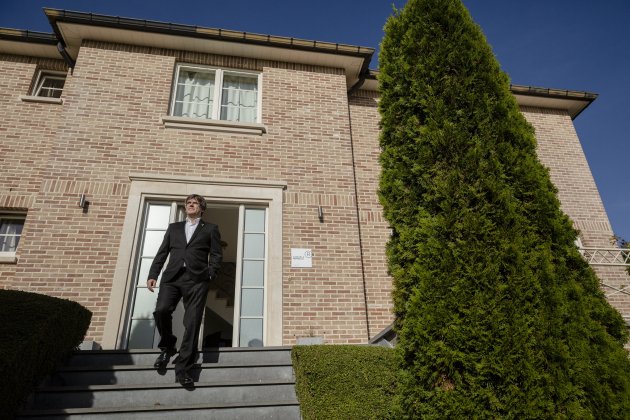
Photo: Sergi Alcàzar
Last Sunday you had a conversation with the secretary general of Podemos, Pablo Iglesias, and both made public the contents of the conversation. Iglesias spoke about political prisoners and exiles...
Firstly, I want to be, and I am, very careful and reserved about the people I speak to and don't speak to, because if the situation I am in has to achieve anything, it must be useful. If I talked about all the people that I have spoken to, it probably would not be useful.
I had already spoken previously with Iglesias, with respect to the no-confidence motion against Rajoy
But you talked to Iglesias and made it public...
In this case, it was in our interests to do so because there was a lot of expectation. It is not the first time we have had contact. It is not the first time we have spoken. We spoke with respect to the no-confidence motion [against Mariano Rajoy, in May]. As always, the relationship with him is correct from a personal point of view and also in terms of political empathy. What had to be explained was the good faith of the conversation. I believe that this is good. The other day I saw that there had been a reprisal against a person from Ciudadanos who came to see me. I find this very regrettable. Therefore, it should not be at all surprising that Mr Pablo Iglesias or anyone else would want to have a conversation and hear the opinion of the representative of a political space which is real. Now, if people want to treat us like a hologram, like a fiction, like a thing that does not exist, then, yes, they isolate us, but in the end the votes of the people are there, our deputies are there, and our deputies are the making or unmaking of prime ministers at the moment.
Our deputies are the making or unmaking of prime ministers at the moment
Indeed, your votes are now indispensable, are you prepared to talk for example about the Spanish budget?
There has always been talking going on. Now, voting for a budget of a government that has put people in prison and in exile, that continues backing the narrative of rebellion and which, on top of that, wants us to sit at a table to speak about only one thing, that no-one has asked for, is a little strange, to say the least. Very strange. The mere fact that a budget has to be negotiated with people in exile and prison, doesn't that indicate to them that something is still not quite right? Are these the best conditions? Of course not. I think that's quite clear.
The mere fact that a budget has to be negotiated with people in exile and prison, doesn't that indicate to them that something is still not quite right?
You say you have had other conversations with Iglesias. How did the initiative for this one occur?
The fact that we talk doesn't mean that at other times we don't also exchange messages. I shan't tell you how the initiative emerged but there was a will for it to happen. It was not anything that we had to request or force. It is normal. From time to time I have contacts and conversations. Do we start from zero and suddenly people turn up? No. I find this very normal. And he does too, quite normal. The fact that everybody is surprised, or that it is so strange and exceptional that a Spanish political leader speaks with a Catalan political leader, independently of what each one represents, and that he has to justify himself, and that politicians like Mr Iceta (PSC) come out and argue about it... What sort of democracy is this? Is it so exceptional that a Spanish political leader wants to talk, to find out, to analyze, not to share... but simply because democracy is based on an exchange of opinions and ideas in debate. Therefore, the fact that there is so much exceptionality in the context in which this conversation has been produced indicates the severely anomalous or dysfunctional state of Spanish democracy.
The exceptionality comes from the fact that it became public and the fact that Iglesias talked to one political leader who is in exile, and another, Oriol Junqueras, who is in prison. This led to disquiet in Madrid and has discredited him as a negotiator for the government
He was not negotiating in the name of the government.
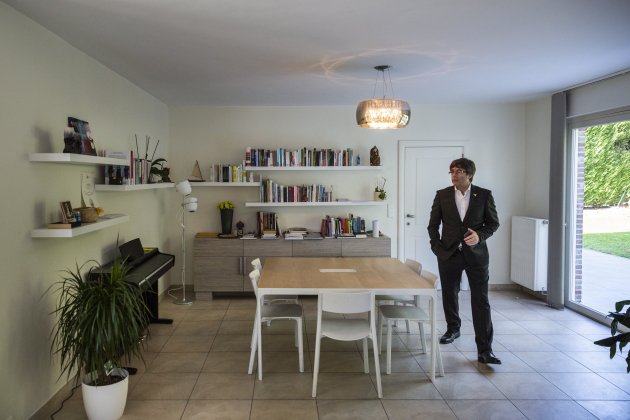
Photo: Sergi Alcàzar
Iglesias is prepared to assume a cost, which he has in the eyes of Spain for speaking, talking to the devil. Well, that's how you do democracy.
Despite everything, there has been a desire to make it clear, that he is not a negotiator.
But the thing is, that is not what he was intending. He has carried out his function as a political leader. In the course of using his leadership, he believes that he has to talk to different political areas, and this is not a crime - on the contrary - and we don't have to hide from it. Has he taken a risk? Yes. It's true. However, he has assumed that. Whether or not you agree with Pablo Iglesias, he is prepared to assume a cost, which he has in the eyes of Spain for speaking, talking to the devil. Well, [what he did is] how you do democracy. Democracy doesn't only consist of talking to those that think like you, but precisely, it is about approaching those you may be very distant from, knowing that there is a conflict and that you want to solve it in a democratic way, and in the democratic way, the main tool is speaking, dialogue, recognition of the other. If there is no recognition of the other party, there are no conditions to do anything.
That Pablo Iglesias assumes a cost to see if he can contribute to creating conditions deserves recognition
Are there conditions today for dialogue?
Naturally, there aren't. Because the contextual conditions would lead us to a dialogue in which we had our hands tied behind our backs, in handcuffs probably, and that's not what you do in a dialogue, because it means there is no recognition by the other side. The Spanish state's recognition with respect to us is that we are criminals, rebels who deserve the heaviest of sentences, and this hasn't changed, it is a fact. And in just a few days, the formal charges will be laid reflecting this. Are these the conditions under which we must dialogue? Of course not. Now, can we create conditions so that there is dialogue? Of course, because for years we have been asking for conditions for dialogue. That Mr Pablo Iglesias assumes a cost to see if he can contribute to creating conditions deserves recognition and, instead of being criticized, Spanish democracy should start to understand that the way to make itself stronger is through attitudes like this, not attitudes that work to criminalize, denigrate, criminally persecute political leaders, as is happening at the moment.
Has anybody from the PSOE government been in touch with you in a more discreet way?
The PSOE government has contact for ordinary matters with the Catalan government through the ministers, vice president, minister of the presidency, and it is here where contacts about the more material things are being channeled.
But what about in terms of political dialogue?
Is there a dialogue committee today between the Spanish government and the Catalan leadership? No. It is not there. Among other things, leaving aside whether today there is or isn't a will from the Spanish government, something I don't know about, what we don't have today are the conditions for dialogue. I repeat, that currently for this dialogue, some would have to be taken there with hands cuffed behind their backs. These are not the conditions in which to hold a dialogue of mutual recognition. Without recognition of the other, we will not be able to make progress. We are a nation that has the right, and has exercised our right, to self-determination, and has taken a decision, and we want it to be respected in the terms that democracies respect their people's decisions, which is in a peaceful way, discussed, but with respect for what is a fundamental principle of the United Nations Charter, which says that the power of states is based on the popular will, not the other way round. We can talk about anything, but what we can't negotiate in any way is that the Catalans are the owners of the future of Catalonia. It isn't anyone else, not a government, not two parliaments, not a given political majority, it is a social majority, it is the people of Catalonia and this is unquestionable, and it is on this basis of recognition that we want to construct spaces of dialogue.
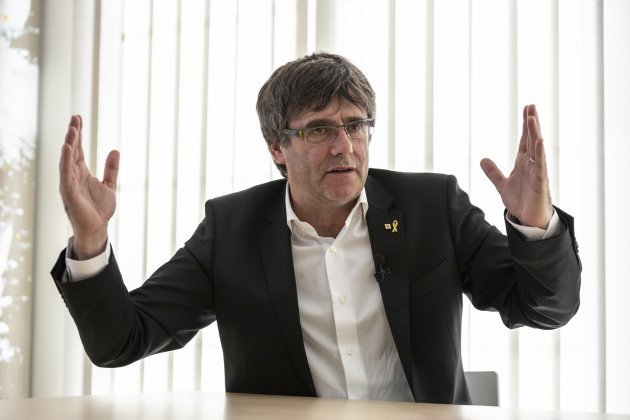
Photo: Sergi Alcàzar
Therefore, to make dialogue possible, is it first necessary to have this recognition ?
Now they recognize us, but they recognize us as criminals. We need them to recognize us as we are, representatives of a popular will that wants a specific objective, and to treat us exactly the same as they treat all other representatives. Arguing in favour of exactly the thing which they say that they want to talk about, can't be used to send us to prison and into exile, and until now it has been used like that. And you can't use scare tactics against mayors, or against ordinary people for their opinions. You can't make it so that people are afraid to see what you say, to see what comments you make... Under these conditions, results are impossible. The recognition of the other, the respect of the other, the decriminalization of what we represent, an end to criminal persecution... that is the ABC of democratic behaviour.
The Spanish government has a huge margin for action, if they want to act politically. They'll decide how. All we are telling them is that, [currently] this is not the way
How does that get traslated into specifics: changes by the public prosecutor...?
The Spanish government has a huge margin, if they want to make act politically. They'll decide how. We won't tell them. All we'll tell them is, this is not the way. They can do it as they like, but not this [current] way. People in prison for their political ideas, peaceful citizens, who have been in preventive detention without trial for more than a year, are an indecency, a disgrace for all of Europe, and therefore, this is not the way, and those who must change these conditions are those who created them. These conditions, I believe everybody recognizes, are not what is required.
How can you pass the budget of a government that keeps you in prison accused of being a criminal? I believe that it must already be clear to the Spanish government what will happen with the budget.
To speak about the budget or any other issue which affects the government majority in the Spanish congress, does all of this have to be resolved?
How can you pass the budget of a government that keeps you in prison accused of crimes, of the worst crimes? It is quite surreal. I don't know, I believe that it must already be clear by now to the Spanish government what will happen with the budget.
There are those who argue that the pro-independence votes will not allow a PSOE government to fall...
That is, they will not allow the fall of a government that accuses those who has to pass their budget of being criminals and that is seeking a sentence of many years in prison for them. What would not be understood, in any way, is if under these conditions we did pass the budget.
You referred to the visit by the Ciudadanos MEP Carolina Punset, how did that go?
They are interested in knowing about and discussing a problem which is of huge importance. If you take a political approach and feel responsible, what you have to when there is a conflict is to get close to it and find out exactly what is happening. Probably, the information that the whole Spanish state has is not sufficient to understand the complexity of this problem. They [those in the Punset visit] acted like democratic politicians, very distant from our positions, but who started from the principle of saying: let's talk to see what happens, in order to know better, maybe to argue their own opinions even better. From this point of view it seemed to me that they had to have access as other people have had access to speak and have an interesting conversation.
Was it?
Very interesting.
I, as president, have met everybody, but I have never seen Mr Rajoy or even Sánchez calling the ANC to their office
The experience of being able to speak with political representatives of other parties, being in exile...
I, as president, have met everybody. But I have never seen Mr Rajoy or Mr Pedro Sánchez calling the [pro-independence civil group] ANC to their office, and not even the [Spanish] parliamentary majority parties wanted to receive Mr Joan Ignasi Elena in representation of the Pact for the Referendum [in 2017]. The anomalous approach is not we have done, what I do, listening to people who don't think like I do. What is anomalous is that they don't listen to us. Here there is the [anti-independence civil group] SCC that has media and financial projection and is granted representation and recognition, which I do not argue with, but this is not paralled by representation and recognition that should also be given to the ANC, which for 7 consecutive years has gathered more than a million people on the street. When a conversation is held with civilized people, when they are interested, it is all the same what the other person thinks. If they are interested in knowing, I find such an exchange very enriching. What has Spanish politics always lacked in general? The curiosity of finding out why all this is happening in Catalonia. I told prime minister Rajoy one day: aren't you interested in knowing why more than two million people want to stop being part of Spain? Doesn't this set off alarms? The intellectual curiosity of knowing what is happening to us and sending your best people to look at what is happening, what you can do, where the error is?
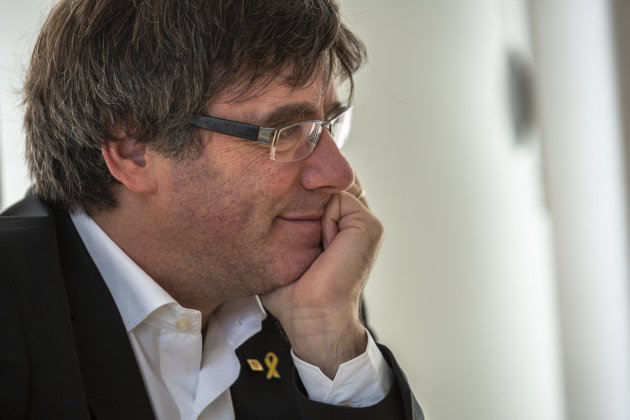
Photo: Sergi Alcàzar
I told prime minister Rajoy one day: aren't you interested in knowing why more than two million people want to stop being part of Spain?
Are there other people who come here from Madrid with this concern?
The concern and interest are on the increase. As a country we have shown a persistence and perseverance that at present all of Europe recognizes. You have to be severely lacking in empathy and sensitivity if a reality such as this does not awaken a minimum curiosity, at least on an intellectual level.
As a country we have shown a persistence and perseverance that at present all of Europe recognizes. You have to be lacking in empathy and sensitivity if a reality such as this does not awaken a minimum curiosity
Have you noticed changes in this regard?
It is too soon to tell if this interest is very great or is minor, but something is moving in Spanish public opinion, I am sure. Because it can't be impenetrable to all that is going on in European public opinion. The trial, apart from those who will have to endure it and their families, is also a worry for the Spanish state and its image. The other day, in an event in one of the countries that I visited after my stay in Germany, a Catalan person, I won't say whether from the PP or Cs but clearly anti-independence and very correct in their behaviour, approached me to argue a little with what I had said, but when we got onto the subject of the prisoners, they told me, The thing is, I don't agree that there should be prisoners in jail, I don't agree that people should be pursued criminally because of this.
I hadn't encountered this attitude. We still see political leaders, and in Catalonia too, who are very pleased that they are in prison, who like our families to suffer, for people to rot in prison, for us to be shut in a box and for them to throw away the key. We still find this, but the majority of normal people, who are decent, whatever they think, already see that this is unacceptable, that when you have a cause, and you love it so much but have to defend it under truncheon blows, with peaceful old people being bashed, when political opponents are put in prison... well, you don't exactly feel very content about that. Therefore, of course I am convinced that a different perception is coming about in Spanish public opinion as well, different to the outlook that inspired the "Go get 'em" cries and has the backing of the king. I don't know how to quantify it because there aren't any surveys either, neither reliable nor unreliable, but I even find it logical that it is happening.
Lately there is a lot of focus on the the figure of the king in terms of the responsibility for what happened with the repression against the independenve movement...
Well, it was he who put himself in the front line of this on 3rd October. He is the leader of the "Go get 'em" team. The "Go get 'em" brigade has a commander called Felipe VI. To the unpleasant surprise of many people who thought he could play a part, he decided to act politically and to do what no monarch in any European democracy has done, which is to put himself in to take the lead politically in the conflict, and in the worst possible way, that is to say, yes, yes, go get 'em. This has probably caused some sectors in the justice system to believe that they are immune from punishment, some sectors in the police that believe they are immune, sectors in the media that believe they have immunity, sectors in the Ibex 35 business community that believe they have immunity..., and this has led to a position very far removed from an exemplary attitude of a democratic head of state in an EU country. It is he who put himself there. This is not only seen by people who support the independence of Catalonia. Nowadays the surveys in Catalonia show that there are more republicans than independence supporters.
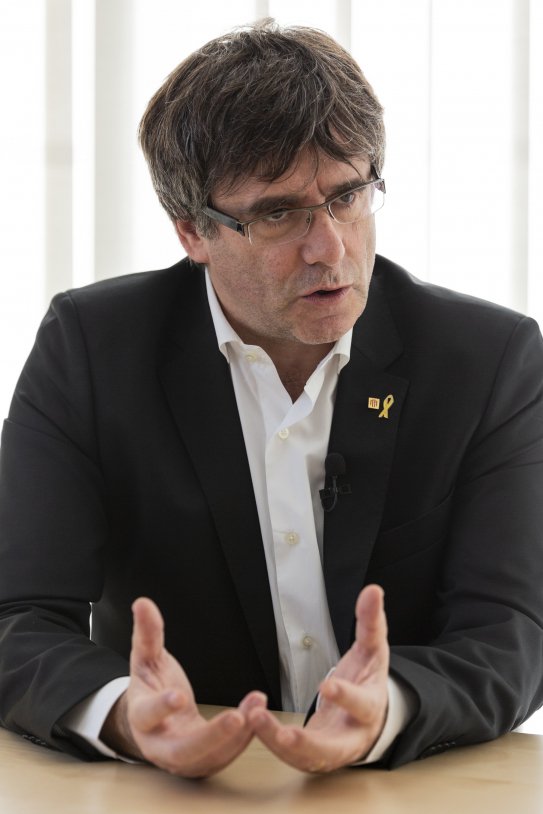
Photo: Sergi alcàzar
Borrell achieved a unanimity in the Flemish Parliament, and ensured that all of Spain knows that the representative of what they consider a region has diplomatic status
Nor did the Spanish foreign minister, Josep Borrell, show himself to be very diplomatic with the criticisms made by the speaker of the Flemish Parliament when he decided to cancel the Spanish diplomatic accreditation of the representative of Flanders...
It achieved a thing that we hadn't achieved yet: unanimity in the Flemish Parliament, in which parties that are clearly against the independence of Catalonia put on yellow ribbons and voted in favour of a resolution against the withdrawal of their representative's diplomatic status. In this case, the Spanish state has done the same thing as it did with article155: by wanting to punish an ideology and a representative of that, it punishes a whole people. They applied 155, not for the pro-independence forces, but for everybody. Now, by wanting to punish the freedom of speech of the speaker of the Flemish Parliament, they punish the entire Flemish people,leaving them without a diplomatic representative in Spain. For European democracies this crosses many red lines. They have achieved two things: unanimity in the Flemish Parliament, and also, they have ensured that all of Spain now knows that indeed, the representative of what they consider a region has diplomatic status and that, therefore, what they say about [Spain] being the most decentralized nation in the world is put in doubt.

